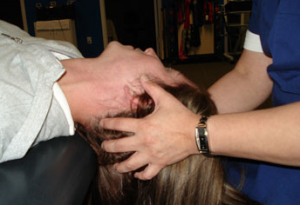 Vestibular rehabilitation therapy is conducive to make the brain relearn to understand and interpret signs from the vestibular system in synchronization with information that is made available from proprioception (sensory awareness of a muscle or a joint) and vision. In the brain, there is a vestibular system that regulates our posture, our balance, poise, our movements, how we walk, move, talk etc.
Vestibular rehabilitation therapy is conducive to make the brain relearn to understand and interpret signs from the vestibular system in synchronization with information that is made available from proprioception (sensory awareness of a muscle or a joint) and vision. In the brain, there is a vestibular system that regulates our posture, our balance, poise, our movements, how we walk, move, talk etc.
The vestibular system in the body includes our eyes, our ears, facial muscles, feet soles etc that have processors which relay information to the brain. In case, the brain is not able to get proper information from this vestibular system, there is no proper balance or posture maintained in the body. Then we have to rely on our proprioception only. In other words, a person who is suffering from sucha problem may have exaggerated patterns like moving the entire body rather than the head to look at one side or exaggerated way of walking or continuously looking down for the fear of falling or tripping. Also, due to overexertion of our body parts which have double work of sensing, one may feel headache, stiffness in the muscle, neck ache, body ache etc.
Vestibular Rehabilitation Therapy Benefits
1. The brain is retrained to understand signals from the vestibular system along with better proprioception.
2. There is better balance in the body.
3. The chance of falls is less, the patient is able to walk in a stable manner.
4. There is freedom from vertigo and dizziness; one does not have to fear about tripping or falling unconscious.
5. There are less involuntary eye movements or nystagmus.
6. Visual vestibular interaction is enhanced; there is better brain-eye co-ordination.
7. Confidence to perform any activity without the fear of feeling dizzy, tripping or fainting.
Why should one go for vestibular rehabilitation therapy?
If a person has a constant fear of losing balance, then it can be quite a nerving affair. One may be disoriented, lose control while walking, have a feeling that the surroundings around him is spinning, get panic attack, feel anxious, get giddiness and nausea. It can be very difficult to live an independent life with such issues.
It is observed that the feeling of dizziness is first felt in the ear. Actually, the inner part of the ear that is quite close to the auditory nerve is the organ that controls the balance of the human body. Doctors have noted that people who suffer from such problems also have issues with inability to hear and also a condition known as ‘Tinnitus’ a buzzing, ringing sound in the ears.
The reasons for inner ear vertigo, dizziness and imbalance can be viral or bacterial infections, trauma, nerve swelling, Meniere’s disease (disease of the inner ear characterized by dizziness), vascular ischemia etc.
For all these issues, vestibular rehabilitation can be quite useful; it not only finds out the underlying cause but also treats it comprehensively.
Vestibular Rehabilitation Therapy Exercises, Procedure
In the beginning, there is a complete evaluation to find out the main cause of your problem. Behavioral patterns like eye movements, balance, posture are observed and noted The doctors communicate with the family doctor or go through your medical history to find out the problems that resulted in your ill–health. Once evaluation is done, the doctor or the therapist in charge of vestibular rehabilitation prepares a personalized plan to treatment that can include exercises that you have to do at the clinic and at home. These exercises can be related to your eyes, head, body etc.
The vestibular rehabilitation exercise that are a part of the therapy include eye-head coordination, postural exercises, ocular motor exercises, vestibular-ocular exercises, reflex stimulation exercises, gait training exercises, balance training exercises and balance training exercises.
In case, you are suffering from dizziness, imbalance, vertigo specially after a neck injury, or have an inner ear problem; if you have suffered concussion or injury in the head, or if you are feeling dizzy and imbalanced as a diabetic or stroke patient, you should consider vestibular rehabilitation therapy. Elderly people who react slowly to stimulus or the ones who have been impacted due to medicines that cause side-effects to the inner and also the ones who are undergoing Acoustic Neuroma treatment can take help from vestibular rehabilitation.